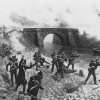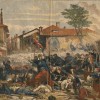text
Timeline
Table of Events
| Date | Event | Created by |
|---|---|---|
| 5 May 1789 to 10 Nov 1799 | French Revolution
On 5 May 1789, the Estates-General, representing the nobility, the clergy, and the common people, held a meeting at the request of the King to address France’s financial difficulties. At this meeting, the Third Estate (the commoners) protested the merely symbolic double representation that they had been granted by the King. This protest resulted in a fracture among the three estates and precipitated the French Revolution. On 17 June, members of the Third Estate designated themselves the National Assembly and claimed to represent the people of the nation, thus preparing the way for the foundation of the republic. Several pivotal events followed in quick succession: the storming of the Bastille (14 July), the approval of the Declaration of the Rights of Man and of the Citizen (26 August), and the march on Versailles that led to the enforced relocation of the royal family to Paris (5-6 October). These revolutionary acts fired the imagination of many regarding the political future of France, and, indeed, all of Europe. The republican period of the revolution continued in various phases until 9-10 November 1799 when Napoleon Bonaparte supplanted the government. ArticlesDiane Piccitto, "On 1793 and the Aftermath of the French Revolution" |
David Rettenmaier |
| 9 Nov 1799 to 18 Jun 1815 | Napoleonic Wars
Historians do not agree on the exact beginning or end of the wars. November 9, 1799 is an early candidate since that is when Napoleon seized power in France. Hoping to ease the difficulty, historians date by isolated wars. They disarticulate the Napoleonic Wars in a linear series:
The successive numerical coordinates for the Coalitions offer regularity, but that regularity is undercut by the shifting make-up of that Coalition (sometimes Prussia was in, sometimes not; sometimes Russia, sometimes not) and by the discontinuity and ambiguity of the dates. Articles |
David Rettenmaier |
| 17 Mar 1805 | Kingdom of Italy founded
This crowning of Napoleon as King of Italy is a result of the French conquest of Italy. Napoleon was crowned King of Italy with the iron crown of Lombardy on 26 May 1805 (crown pictured above). His full title was "Emperor of the French and King of Italy." ArticlesAlison Chapman, "On Il Risorgimento" Related ArticlesErik Simpson, "On Corinne, Or Italy" Marjorie Stone, “On the Post Office Espionage Scandal, 1844″ |
David Rettenmaier |
| 17 Mar 1805 |
|
David Rettenmaier |
| 6 Apr 1814 to 26 Feb 1815 | Napoleon exiled to ElbaNapoleon was exiled to Elba, an island in the Meditteranean, after he abdicated on 6 April 1814. He spent nine months and 21 days on the island, then attempted to retake his empire, leaving the island on 26 February 1815. Napoleon was definitively defeated at the Battle of Waterloo on 18 June 1815. |
Dino Franco Felluga |
| 10 Apr 1814 | Battle of Toulouse
Related ArticlesSean Grass, “On the Death of the Duke of Wellington, 14 September 1852″ |
David Rettenmaier |
| 18 Jun 1815 | Battle of Waterloo
Related ArticlesSean Grass, “On the Death of the Duke of Wellington, 14 September 1852″ Mary Favret, "The Napoleonic Wars" Frederick Burwick, “18 June 1815: The Battle of Waterloo and the Literary Response” |
David Rettenmaier |
| 5 May 1821 | Death of NapoleonNapoleon Bonaparte died on 5 May 1821 while in Exile on the island of Saint Helena. Image: Horace Vernet, Napoleon on his Death Bed (1826). |
Dino Franco Felluga |
| 4 Jun 1859 | Battle of Magenta
ArticlesAlison Chapman, "On Il Risorgimento" Related ArticlesMarjorie Stone, “On the Post Office Espionage Scandal, 1844″ |
David Rettenmaier |






